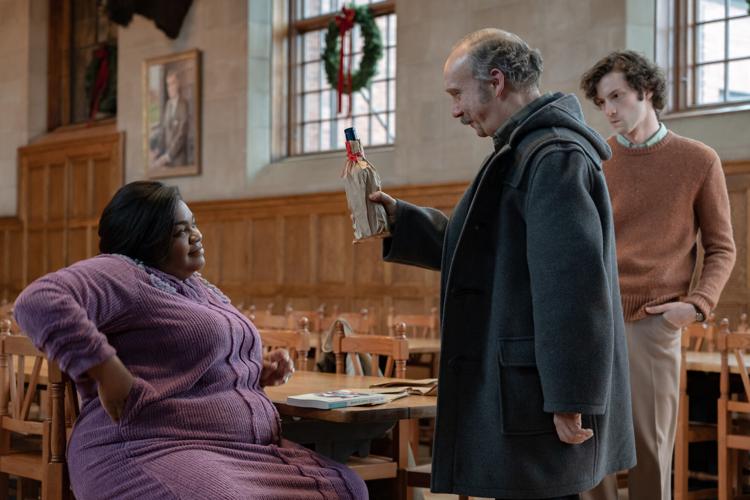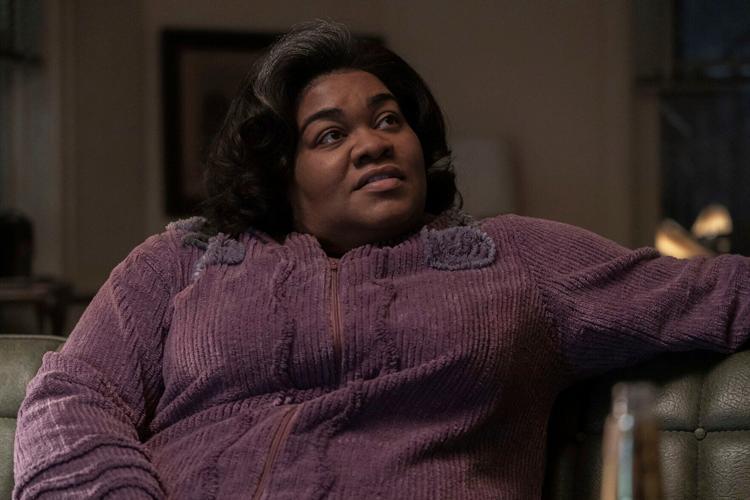There’s more than a little “Green Book" in Alexander Payne’s latest, “The Holdovers.”
Like the Oscar-winning best picture, Payne’s look at an unlikely friendship shows how circumstances often bring the most disparate people together.
In this case, that’s a gruff instructor at a New England prep school, a smart-mouthed student and the school’s head cook.
They’re packaged over the holidays when – for whatever reason – there isn’t family to pull them in.
From left, Dominic Sessa stars as Angus Tully, Da’Vine Joy Randolph as Mary Lamb and Paul Giamatti as Paul Hunham in "The Holdovers."
Paul Giamatti plays Paul Hunham, a Barton School grad who doesn’t suffer anyone, least of all the students. Since the ancient civilizations teacher doesn’t have a family, he’s assigned to watch the students left at school. Circumstances remove all but one from his charge – Angus Tully (Dominic Sessa), a troubled teen who is likely headed to military school if the stint here doesn’t work out. They’re joined by Mary Lamb (Da’Vine Joy Randolph), the cook whose son died earlier in the year. He, too, went to Barton and had few of Tully’s advantages.
Set in 1970, “The Holdovers” takes full advantage of the period, leaning into pinball machines, “The Newlywed Game” and nonelectronic forms of communication. It’s a great wallow for those who lived through the times but also an equalizer that lets the three approach friendship on their own terms.
When Angus injures himself in a gym stunt, Paul covers for him at the hospital and the “entre nous” aspect of the story begins to take shape. The two get out of the school’s depressing interior and discover the world outside. Mary comes, too, and when the three head to Boston for a “field trip,” it’s clear change is in the air.
Payne plays with the edges Giamatti embraced in “Sideways” and lets Randolph toy with an accent that’s just perfect. His greatest feat, though, is bringing out nuance in Sessa, the film’s newcomer. It’s easy to see why the boy aggravates people; it’s also easy to see how he can be loved. The performance is fascinating and multi-layered.
When the two adults tap into their ward’s weaknesses, “The Holdovers” becomes one of those heartwarming looks at a season that can be downright brutal. Making their own Christmas, the three celebrate under a lopsided tree, get unwanted gifts and attend a party that lets each have a moment of vulnerability.
In Boston, they’re even more embraceable. Naturally, all doesn’t end well that begins well. The field trip brings consequences and an awakening that proves adversity builds character.
Part “Dead Poet’s Society,” part “Dutch,” “The Holdovers” thrives on David Hemingson’s screenplay. It doesn’t underscore the obvious, but it does champion the virtues of friendship, no matter how qualified.
To make sure the audience understands this takes place in a different time, Payne uses old-school techniques (one shot will remind you of “The Graduate”) and 35-millimeter film. Add in period-specific ads, clothes and behavior and you’ll see why the character’s problems aren’t easily dismissed with social media.
Like “Green Book,” “The Holdovers” shows us how drastically life has changed, yet emotions haven’t. Hunham talks about the value of history; “The Holdovers” shows how we’re constantly repeating mistakes. It's a great trip to the past and a perfect look at how we can improve the future.
Movie critic Bruce Miller says "Taylor Swift: The Eras Tour" is spectacular and easy to watch, though it may be a long sit for some viewers. Swift's lyrics hit the target right in the heart.
Movie critic Bruce Miller says "Killers of the Flower Moon” is true cinema. It’s art in its highest form that never fails to entertain.







